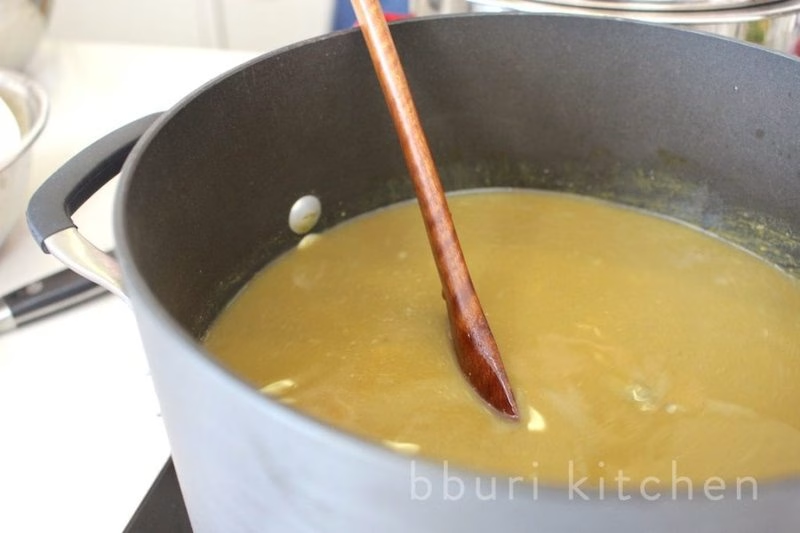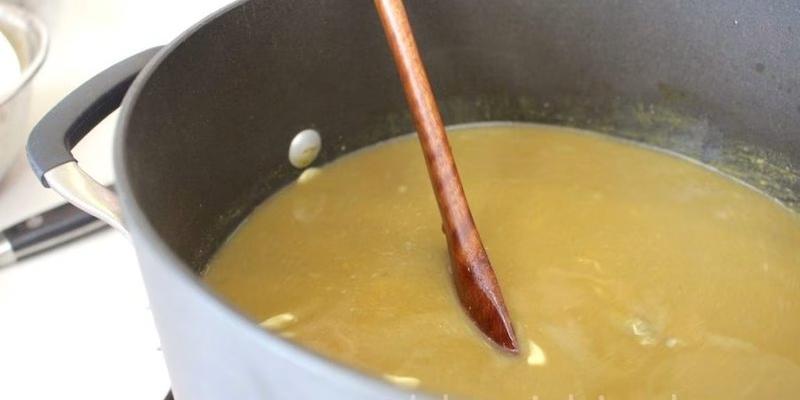
Jeonbok Juk (Abalone Porridge) is a delightful and comforting dish that hails from Korea, known for its rich flavor and nutritional benefits. This warm porridge makes a perfect meal for chilly evenings or when you’re feeling under the weather. The star ingredient, abalone, is a prized shellfish that offers a unique umami taste and a tender texture that elevates this dish to gourmet status.
The origins of Jeonbok Juk can be traced back to traditional Korean cuisine, where it was often prepared for those in need of nourishment. The soothing qualities of this porridge make it a popular comfort food, especially for the elderly and convalescents. In this article, we’ll guide you through the process of making Jeonbok Juk (Abalone Porridge) at home, explore the essential ingredients, cooking tips, and answer some frequently asked questions about this delightful dish.
Ingredients
| Ingredient | Measurement | Description |
|---|---|---|
| Abalone | 1 cup, chopped | Fresh abalone adds a unique briny flavor to Jeonbok Juk (Abalone Porridge) and is packed with nutrients. |
| Short-grain rice | 1 cup | This rice provides the creamy texture essential to making the perfect porridge. |
| Water or Chicken broth | 6 cups | Using rich chicken broth enhances the flavor profile of your Jeonbok Juk (Abalone Porridge). |
| Garlic | 3 cloves, minced | Fresh garlic enhances the aroma and depth of flavor in Jeonbok Juk (Abalone Porridge). |
| Ginger | 1 inch, minced | Ginger brings a zesty warmth that complements the delicate seafood flavors. |
| Green onions | 2, chopped | These add a fresh kick and vibrant color to your porridge. |
| Salt | to taste | Enhances all the flavors and balances the dish. |
| Sesame oil | 1 tablespoon | This oil adds a nutty aroma and finish, making your Jeonbok Juk (Abalone Porridge) even more irresistible. |
Step-by-Step Instructions
- Prepare the Ingredients: Start by rinsing the short-grain rice under cold water until the water runs clear. This removes excess starch and helps achieve that perfect creamy texture in your Jeonbok Juk (Abalone Porridge).
- Cook the Abalone: In a large pot, heat a tablespoon of sesame oil over medium heat. Sauté the minced garlic and ginger until fragrant, then add the chopped abalone. Cook for about 2-3 minutes until they are slightly golden, allowing the flavors to meld.
- Add the Rice: Stir the rinsed rice into the pot, coating it with the garlic, ginger, and abalone mixture. This step is crucial as it helps infuse the rice with the delicious flavors of Jeonbok Juk (Abalone Porridge).
- Pour in Broth: Carefully add the water or chicken broth to the pot. Bring the mixture to a gentle boil while stirring occasionally. Once it’s boiling, reduce the heat and let it simmer for approximately 30-40 minutes, stirring frequently to avoid sticking.
- Season the Porridge: After 30-40 minutes, check the consistency. If it’s too thick, add more broth or water until you reach your desired texture. Season with salt to taste, and stir in the chopped green onions for a fresh finish.
- Serve Hot: Ladle the Jeonbok Juk (Abalone Porridge) into bowls and drizzle with a bit more sesame oil. Enjoy this delicious comfort food hot, garnished with extra green onions, if desired!
Pro Tips
- Quality Matters: Use fresh abalone for the best flavor. If you can’t find fresh ones, dried abalone can be rehydrated, but the texture might differ.
- Experiment with Broth: For a richer flavor, try using seafood broth instead of chicken broth.
- Consistency Preferences: Adjust the liquid to rice ratio depending on how thick or runny you prefer your porridge.
- Garnishes: Feel free to top your Jeonbok Juk with additional sesame seeds or a sprinkle of nori for added flavor.
- Leftovers: Store any leftovers in an airtight container in the fridge. Reheat gently on the stove, adding a splash of water or broth if it thickens too much.
Nutritional Information
| Nutrient | Per Serving |
|---|---|
| Calories | 240 |
| Protein | 14g |
| Carbohydrates | 36g |
| Saturated Fat | 1g |
| Fiber | 2g |
| Cholesterol | 20mg |
| Sugars | 0g |
| Fat | 4g |
FAQs
What is the best way to store Jeonbok Juk (Abalone Porridge)?
To store Jeonbok Juk, let it cool to room temperature and place it in an airtight container. It can be kept in the refrigerator for up to three days. Reheat gently on the stove with a splash of water or broth.
Can Jeonbok Juk (Abalone Porridge) be made vegan or gluten-free?
Yes! For a vegan version, substitute abalone with mushrooms like shiitake or oyster mushrooms, and use vegetable broth. Ensure your rice is gluten-free for a gluten-free version.
What are the best side dishes to serve with Jeonbok Juk (Abalone Porridge)?
Jeonbok Juk pairs wonderfully with pickled vegetables like kimchi or a simple side of stir-fried greens.
How long does it take to prepare Jeonbok Juk (Abalone Porridge)?
The total preparation and cooking time is approximately one hour, making it a relatively quick yet rewarding dish.
Can I freeze Jeonbok Juk (Abalone Porridge) for later?
Yes, Jeonbok Juk can be frozen. Just make sure to cool it completely before placing it in a freezer-safe container. It can be kept frozen for up to three months.
How can I enhance the umami flavor of Jeonbok Juk (Abalone Porridge)?
Adding a splash of fish sauce or soy sauce can significantly boost the umami flavor without overpowering the dish.
Is Jeonbok Juk healthy?
Absolutely! With its nutrient-rich ingredients like abalone and rice, it provides a balanced source of protein and carbohydrates. Plus, it’s low in fat!
Can I use different rice types for Jeonbok Juk (Abalone Porridge)?
While short-grain rice is traditional, you can experiment with other types like jasmine or brown rice, but the texture will vary.
There you have it, a detailed guide on crafting your very own Jeonbok Juk (Abalone Porridge) at home! This dish not only brings comfort but also serves as a delicious way to enjoy the benefits of abalone. We hope you find joy in making this flavorful and nutritious porridge. Try it out, and let us know your experience in the comments!






